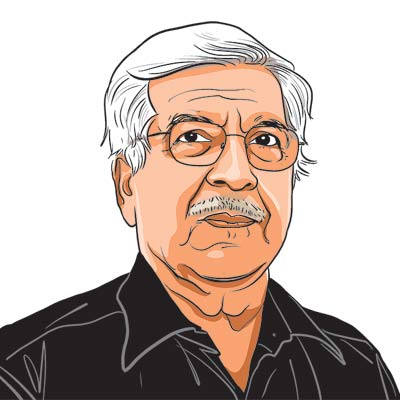Opinion The dreamlife of cities
Umashankar Joshis vision could enrich Ahmedabad,then and now....
Great poets make your imagination fly. Cities of bricks and concrete develop a soul from them. Umashankar Joshi,whose birth centenary is being celebrated now,was an institution in Ahmedabad when you were with him,he created a world of imagination and harmony. Ordinary events found a dream-like beauty and significance.
Ahmedabad in the late 60s was a city full of intellectual life. It was industrialising. When the rest of India was cursing capitalism,Ahmedabads textile seths built petro-chemical empires,emerging from the P.C. Mahalanobis socialist dream,in what was called the joint sector. Cooperatives and NGOs were also expanding. There was,of course,a communal riot in 1969. And yet,the city had an intellectual soul.
Its economists were on a different train,however western Indian socialists were respected. D.T. Lakdawala,V.M. Dandekar and M.L. Dantwala passionately believed in egalitarian objectives but were always savvy about markets and the strategic instruments to achieve them. Nitin Desai once described it as the practical market socialism of western India. But the real outlier was B.R. Shenoy,who built a school in Ahmedabad,castigating those who never made money. His world was unfashionable as the country moved to the left,but he had a hardcore following.
The world of Ahmedabad was not only chai and khaman in the homes of the dons and journalists or tomato soup and ice cream in the Ellisbridge Havmor. It was that of western Indian Gandhian values and socialism confronting Shenoys acolytes. Lakdawala worked in Ahmedabad and Mumbai. Dantwala would come occasionally. Nirhu Desai was editing Gujarat Samachar,which one felt compelled to read before the English newspapers. All of them,and people like S.V. Desai and Yashwant Shukla,were openly contemptuous of the metropolises.
Umashankar Joshi and my architect-friend Balkrishna Doshi would elevate life,from the limited world of journalists,economists,those who had been jailed by the imperial power (like Dantwala and Gandhian and Congress socialists) to the peace of trees and forests and the sound of falling raindrops. In the fiery world of economics and capitalism and markets and even Gandhian socialism,there was always conflict. Joshi and Doshi,however,found peace and harmony in the lasting world of Gandhi. Doshi would plant a cluster of trees in a house,and the world and humanity were at peace. Umashankarbhai would take you there with his chaste Gujarati verse,and create another world.
I once travelled with him in the region where western Rajasthan melts into northeastern Gujarat. The moon was full,and its light over the sand created an ethereal effect as the train chugged through little village platforms. It is the same experience as in the stretches of the cold Mongolian desert,or Ladakh,or the dark clouds,winds and waves in Helsinki harbour or in Swedish fjords at night. It was an experience never to be forgotten. The poet wanted to go into the forest without a bhumiya (guide). For the time you spent with him,only this world of beauty was real. If you have lived it once,you are never the same again.
Like all poets,he was not practical. Indira Gandhi nominated him to the Rajya Sabha but he would take his idealised politics seriously and intervene in parliamentary debates. He would also criticise all and sundry. He was politely told that nominated members are not political but intellectual contributors to the debates. They cannot even vote. But Umashankarbhai was not deterred. When a great man with a limited idea intervenes in the lives of ordinary beings with unalloyed gold,there can be problems because practical men use alloyed gold,and indeed,the alloy gives it strength. As the dean of the first school of linguistics at Gujarat University,and later its vice chancellor,he put in all his might in replacing English with the mother tongue,with the logic that you can only be creative in this first language. Two generations were lost and it has been reversed only now,with Gujarati youngsters now overwhelming the higher civil services,chartered accountancy and other national exams from where they were long exiled.
It was a different world. We are now richer,materially more prosperous,but perhaps poorer. With the mindless violence and disrespect for social authority,narrow hatred and criminalisation (in spite of the imported goodies and instant soul masala from the wired global village),there is no time for the men who want to go to the forest and look for the stars without a bhumiya. Space for someone like Umashankar Joshi,in this canned skill-based education and communication world,could give us the peace of the forests,the stars and sand dunes.
The writer,a former Union minister,is chairman,Institute of Rural Management,Anand
express@expressindia.com





